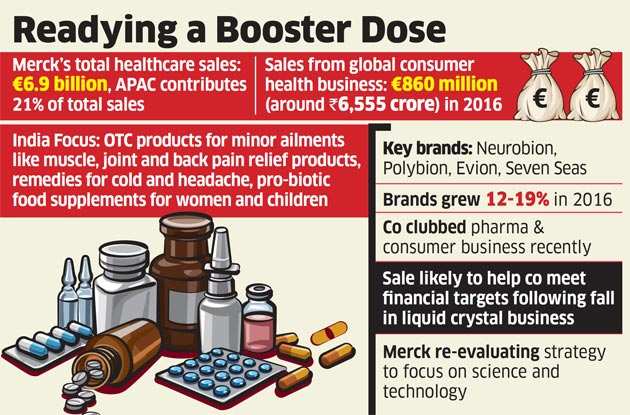Merck KGaA is looking to sell its $1-billion global consumer health business, including that in India, in a move that the German drugmaker said will be an important step in executing its science and technology-focused strategy.
The company is preparing for “strategic options” for its consumer health business globally, Merck LtdBSE 3.38 %, the listed Indian subsidiary of the German major, notified the Bombay Stock Exchange on Tuesday. This includes a potential full or partial sale of the business as well as strategic partnerships, it stated.
“We have continued to transform Merck over the last years into a leading science and technology company. Thereby we regularly review our portfolio in the context of our innovation driven strategy,” Merck Group chief executive Stefan Oschmann said in a global news release. Healthcare largely focuses on the biopharma pipeline, he added.
Sources said a sale will help the company meet its financial targets as a decline in its liquid crystal business has forced it to review strategy. Merck’s global consumer health business reported net sales of euro 860 million (around Rs 6,555 crore) in 2016, according to the company’s release. A Merck Ltd spokesperson refrained from commenting on how much India contributed to this business.

In India, Merck’s consumer health business is one of the largest in supplying vitamins, minerals and supplements (VMS), with flagship brands such as Neurobion, Polybion and Evion growing twice above the category growth, according to the local company’s 2016 annual report. These brands grew 12-19%, according to this report.
The group’s total healthcare business achieved net sales of euro 6.86 billion, with the Asia-Pacific region contributing 21% to this. The company sells a broad range of over-the counter products for the treatment of minor ailments like muscle, joint and back pain as well as remedies for cold and headache. It also offers probiotic food supplements, especially for women and children.
On Tuesday, shares of Merck Ltd closed 0.25% lower at Rs 1,206.60 on the BSE. Analysts are surprised at the timing of the announcement as only recently the company had clubbed its pharma and consumer businesses together. A sale would potentially entail splitting the two again, they feel.
The management in the recent past has informally sounded out prospective buyers, only to be held back by the founding family that owns 70% of Merck and favoured a diversified strategy for the drugmaker.
Merck’s global consumer health portfolio has been enhanced over the past years, stated Belén Garijo, its chief executive for the healthcare business.
“We have maintained a solid position in attractive markets and demonstrated a pattern of profitable growth. We expect increasing internal constraints to fund the business to reach the required scale. Fully anticipating this, we are preparing strategic options,” she said.
Merck, which traces its roots to a 17th-century pharmacy, is focusing on its pharmaceuticals unit, where it is pinning growth hopes on cancer immunotherapy treatment Bavencio and multiple sclerosis pill Mavenclad after a string of setbacks.
It has also built a global biotech laboratory supplies business with takeovers of Millipore and Sigma-Aldrich in 2010 and 2016.
Merck saw liquid crystals revenue surge at the turn of the century with the advent of flat-screen LCD TVs, having failed for decades to find a commercial use for the substance.
But Chinese rivals have been chipping away at its dominant market position, leading it to spend billions on takeovers to counterbalance its dependence on the high-tech screen chemicals that still account for about 15% of group earnings.
Source: Economic Times